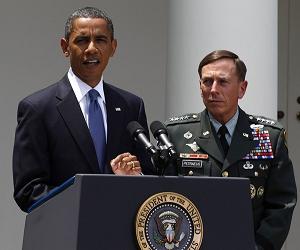Petraeus’s False Hope

June 2010 has assumed the grim record of deadliest month, 80 coalition deaths and counting. July could be worse. With no one left to turn to, US President Barack Obama appointed CENTCOM commander and general David Petraeus to rescue him from Afghanistan. And therein lies the first of many fatal flaws in the decision.
His strategy already in disarray, Obama scrambled to heave off one final shot – The Petraeus Hail Mary.
But the Wall Street Journal’s conclusion lingers at the surface: “In choosing to throw a Hail Mary pass to General Petraeus, the President has chosen a commander who understands counterinsurgency, who helped to design the current Afghan strategy, and who knows how to lead and motivate soldiers. He – and they – need a Commander in Chief willing to show equal commitment and staying power.”
What Petraeus really means is that, one way or the other, US and NATO intervention in Afghanistan has finally arrived at the end of a seemingly endless road. The positives of Petraeus: he is, generally speaking, what people make of him, a diligent COIN student and polished public speaker. Architect of Iraq and Afghanistan’s surges, and McChrystal’s COIN mentor, Petraeus provides the smoothest transition during this high-stakes moment.
Overlooked is how unstable Iraq appears, how it’s nevertheless superficially compared to Afghanistan’s complexity, and Petraeus’s woeful attempt to contain al-Qaeda with Special Forces in Yemen and Somalia. Where the group actually plans attacks on Western targets.
But if anyone in the US military can turn Afghanistan around, Petraeus is the best bet.
His cons are Obama’s worst nightmare: if Petraeus fails no one else can ably replace him. Obama just put in his closer, played his trump card which he was undoubtedly holding until after July 2011. Now he has nothing left. Justifying another general will be impossible if Petraeus cannot crack the Taliban code in time, and America’s war will be forced to end (many will consider this a positive).
Ultimately Petraeus untangles few roots of discord between the White House and Pentagon. Obama pressured him to speed up the surge beyond his calculations, from fall 2010 to summer, a demand both he and Chairman of the Joint Chiefs of Staff Michael Mullen opposed until twisted into submission. Petraeus is far more articulate than the outgoing Stanley McChrystal, but his military views on Afghanistan are roughly the same.
That McChrystal was forced out for similar behavior to Petraeus’s actions, albeit more theatrical, is an overt contradiction.
The White House became alerted to the Rolling Stone’s article last week, triggering an immediate debate on McChrystal’s status and Petraeus as the replacement. McChrystal’s boiling point had already risen since 2009, his resignation long in the making. But as the White House debated McChrystal’s fate, Petraeus also found himself loudly undercutting Obama. Testifying before Congress, Petraeus pushed back July 2011 by calling it a transfer date, not a withdrawal date – absolutely not a deadline – and added that everything is conditions based.
White House Chief of Staff Rahm Emanuel was forced to quell the growing clamor over the deadline’s definition – because of General Petraeus. So why expect smoother sailing? Because he speaks better? He still thinks like General McChrystal.
Now a chain of command is undoubtedly paramount to upholding a stable democracy. At the same time, civilian chain of command bent on deciding war policy through politics more than strategy presents an equal danger. McChrystal’s judgment to supersede the White House was wrong, but Obama, having already underestimated Afghanistan’s requirements, is guilty of grave deception against the American people.
Rolling Stone author Matt Hastings writes, “Even those closest to McChrystal know that the rising anti-war sentiment at home doesn’t begin to reflect how deeply f….d up things are in Afghanistan. ‘If Americans pulled back and started paying attention to this war, it would become even less popular,’ a senior adviser to McChrystal says.”
Refusing to review US strategy in any significant way while attempting to keep the situation as hidden as possible only furthers the deception, as does installing and hailing Petraeus after he committed a similar deed as McChrystal.
Those believing the chain of command is being upheld by Petraeus might want to pay closer attention to Washington’s power structure. He may pose an even greater threat, being far more “elite,” politically connected, and deeply aligned with figures like US Defense Secretary Robert Gates. Rumors of a presidential campaign refuse to die (Gates could simply keep his job). Does Petraeus really stabilize America’s chain of command or challenge it?
Unless Obama signed off privately on an extension to Petraeus’s deadline, militarily necessary but politically perilous, Washington will be right back to its conflict of interest next December and into July. This is no way to wage war, especially the trial of fire that is counterinsurgency. McChrystal’s termination should have focused attention here. Yet even as the White House and US media steer the conversation towards chain of command and away from Afghanistan’s crumbling strategy, Petraeus’s own opposition to key aspects of Obama’s surge, primarily a lack of troops and July 2011, remains lost in the shadows.
McClatchy reported earlier this month, “a number of U.S. and allied military, intelligence and diplomatic officials have been warning for months that the American strategy in Afghanistan is failing and complaining that no one at a high level in the Obama administration wants to hear their discouraging words.”
And they still don’t.
James Gundun is a political scientist and counterinsurgency analyst based in Washington D.C. Contact him in The Trench, a realist foreign policy blog, atwww.hadalzone.blogspot.com.

